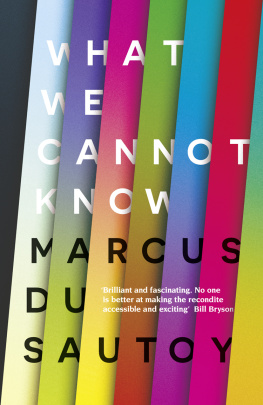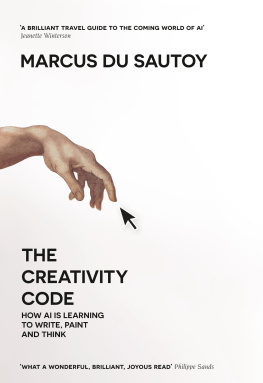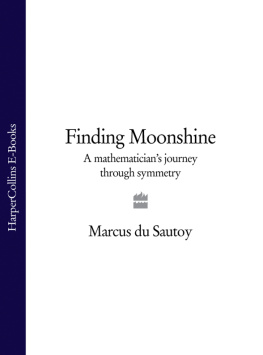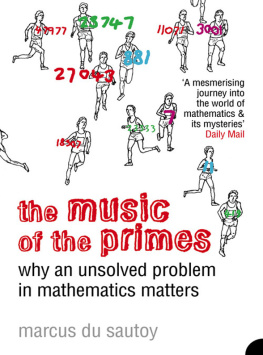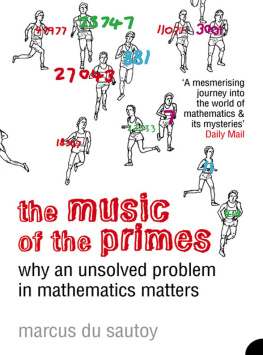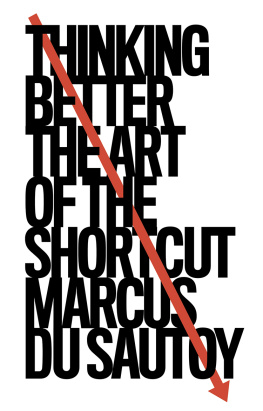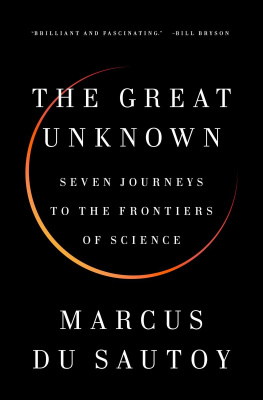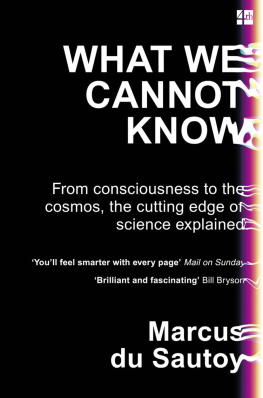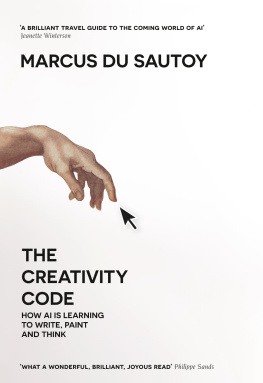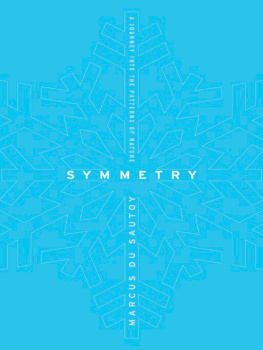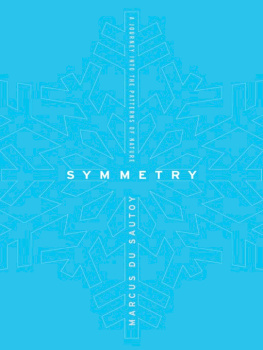Marcus du Sautoy - What We Cannot Know: Explorations at the Edge of Knowledge
Here you can read online Marcus du Sautoy - What We Cannot Know: Explorations at the Edge of Knowledge full text of the book (entire story) in english for free. Download pdf and epub, get meaning, cover and reviews about this ebook. year: 2016, publisher: Harper Collins, genre: Science. Description of the work, (preface) as well as reviews are available. Best literature library LitArk.com created for fans of good reading and offers a wide selection of genres:
Romance novel
Science fiction
Adventure
Detective
Science
History
Home and family
Prose
Art
Politics
Computer
Non-fiction
Religion
Business
Children
Humor
Choose a favorite category and find really read worthwhile books. Enjoy immersion in the world of imagination, feel the emotions of the characters or learn something new for yourself, make an fascinating discovery.
- Book:What We Cannot Know: Explorations at the Edge of Knowledge
- Author:
- Publisher:Harper Collins
- Genre:
- Year:2016
- Rating:5 / 5
- Favourites:Add to favourites
- Your mark:
- 100
- 1
- 2
- 3
- 4
- 5
What We Cannot Know: Explorations at the Edge of Knowledge: summary, description and annotation
We offer to read an annotation, description, summary or preface (depends on what the author of the book "What We Cannot Know: Explorations at the Edge of Knowledge" wrote himself). If you haven't found the necessary information about the book — write in the comments, we will try to find it.
What We Cannot Know: Explorations at the Edge of Knowledge — read online for free the complete book (whole text) full work
Below is the text of the book, divided by pages. System saving the place of the last page read, allows you to conveniently read the book "What We Cannot Know: Explorations at the Edge of Knowledge" online for free, without having to search again every time where you left off. Put a bookmark, and you can go to the page where you finished reading at any time.
Font size:
Interval:
Bookmark:


4th Estate
An imprint of HarperCollinsPublishers
1 London Bridge Street
London SE1 9GF
www.4thestate.co.uk
First published in Great Britain by 4th Estate in 2016
Copyright Marcus du Sautoy 2016
Marcus du Sautoy asserts the right to be identified as the author of this work.
A catalogue record for this book is available from the British Library
All rights reserved under International and Pan-American Copyright Conventions. By payment of the required fees, you have been granted the non-exclusive, non-transferable right to access and read the text of this e-book on screen. No part of this text may be reproduced, transmitted, down-loaded, decompiled, reverse engineered, or stored in or introduced into any information storage and retrieval system, in any form or by any means, whether electronic or mechanical, now known or hereinafter invented, without the express written permission of HarperCollins.
Source ISBN: 9780007576661
Ebook Edition May 2016 ISBN: 9780007576579
Version: 2016-04-21
Many thanks to the people who helped to make this book possible:
My editor at 4th Estate: Louise Haines.
My agent at Greene and Heaton: Antony Topping.
My assistant editor: Sarah Thickett.
My illustrator: Joy Gosney.
My copy-editor and proofreaders: Eddie Mizzi, Jan McCann, Stephen Guise.
My readers: Andreas Brandhuber, Joseph Conlon, Pedro Ferreira, Chris Lintott, Dan Segal and Christiane Timmel.
My interviewees: Bob May, Melissa Franklin, John Polkinghorne, John Barrow, Roger Penrose and Christof Koch.
My employers: The Mathematical Institute, The Department of Continuing Education, New College, the University of Oxford.
My patron: Charles Simonyi.
My family: Shani, Tomer, Magaly and Ina.
CONTENTS
The unpredictable and the predetermined unfold together to make everything the way it is. Its how nature creates itself, on every scale, the snowflake and the snowstorm. It makes me so happy. To be at the beginning again, knowing almost nothing.
Tom Stoppard, Arcadia
There is a single red dice sitting on my desk next to me. I got the dice on a trip to Las Vegas. I fell in love with it when I saw it on the craps table. It was so perfectly engineered. Such precise edges coming to a point at the corners of the cube. The faces so smooth you couldnt feel what number the face was representing. The pips are carved out of the dice and then filled with paint that has the same density as the plastic used to make the dice. This ensures that the face representing the 6 isnt a touch lighter than the face on the opposite side with a single pip. The feeling of the dice in the hand is incredibly satisfying. It is a thing of beauty.
And yet I hate it.
Its got three pips pointing up at me at the moment. But if I pick it up and let it fall from my hand I have no way of knowing how it is going to land. It is the ultimate symbol of the unknowable. The future of the dice seems knowable only when it becomes the past.
I have always been extremely unsettled by things that I cannot know. Things that I cannot work out. I dont mind not knowing something provided there is some way ultimately to calculate whats going on. With enough time. Is this dice truly so unknowable? Or with enough information can I actually deduce its next move? Surely its just a matter of applying the right laws of physics and solving the appropriate mathematical equations. Surely this is something I can know.
My subject, mathematics, was invented to give people a glimpse of whats out there coming towards us. To look into the future. To become masters of fate, not its servants. I believe that the universe runs according to laws. Understand those laws and I can know the universe. Spotting patterns has given the human species a very powerful way to take control. If theres a pattern then I have some chance to predict the future and know the unknowable. The pattern of the Sun means I can rely on it rising in the sky tomorrow or the Moon taking 28 sunrises before it becomes full again. It is how mathematics developed. Mathematics is the science of patterns. Being able to spot patterns is a powerful tool in the evolutionary fight for survival. The caves in Lascaux show how counting 13 quarters of the Moon from the first winter rising of the Pleiades will bring you to a time in the year when the horses are pregnant and easy to hunt. Being able to predict the future is the key to survival.
But there are some things which appear to have no pattern or that have patterns that are so complex or hidden that they are beyond human knowledge. The individual roll of the dice is not like the rising of the Sun. There seems to be no way to know which of the six faces will be pointing upwards once the cube finally comes to rest. It is why the dice has been used since antiquity as a way to decide disputes, to play games, to wager money.
Is that beautiful red cube with its white dots truly unknowable? Im certainly not the first to have a complex relationship with the dynamics of this cube.
On a recent trip to Israel I took my children to an archaeological dig at Beit Guvrin. It was such a popular settlement in ancient times that the site consists of layer upon layer of cities built on top of each other. There is so much stuff in the ground that the archaeologists are happy to enlist amateurs like me and my kids to help excavate the site even if a few pots get broken along the way. Sure enough, we pulled out lots of bits of pottery. But we also kept unearthing a large number of animal bones. We thought they were the remains of dinner, but our guide explained that in fact they were the earliest form of dice.
Archaeological digs of settlements dating back to Neolithic times have revealed a disproportionately high density of heel bones of sheep or other animals among the shattered pottery and flints that are usually found in sites that humans once inhabited. These bones are in fact ancestors of my casino dice. When thrown, the bones naturally land on one of four sides. Often there are letters or numbers carved into the bones. Rather than gambling, these early dice are thought to have been used for divination. And this connection between the outcome of the roll of a dice and the will of the gods is one that has persisted for centuries. Knowledge of how the dice would land was believed to be something that transcended human understanding. Its outcome was in the lap of the gods.
Increasingly these dice assumed a more prosaic place as part of our world of leisure. The first cube-shaped dice like the one on my desk were found around Harappa in what is now northeast Pakistan, where one of the first urban civilizations evolved, dating back to the third millennium BC. At the same time, you find four-faced pyramid dice appearing in a game that was discovered in the city of Ur, in ancient Mesopotamia.
The Romans and Greeks were addicts of games of dice, as were the soldiers of the medieval era who returned from the Crusades with a new game called hazard, deriving from the Arabic word for a dice: al-zahr. It was an early version of craps, the game that was being played in the casino in Vegas where I picked up my dice.
If I could predict the fall of the dice, all the games that depend on them would never have caught on. The excitement of backgammon or hazard or craps comes from not knowing how the dice are going to land. So perhaps gamers wont thank me as I try to predict the roll of my dice.
Font size:
Interval:
Bookmark:
Similar books «What We Cannot Know: Explorations at the Edge of Knowledge»
Look at similar books to What We Cannot Know: Explorations at the Edge of Knowledge. We have selected literature similar in name and meaning in the hope of providing readers with more options to find new, interesting, not yet read works.
Discussion, reviews of the book What We Cannot Know: Explorations at the Edge of Knowledge and just readers' own opinions. Leave your comments, write what you think about the work, its meaning or the main characters. Specify what exactly you liked and what you didn't like, and why you think so.

